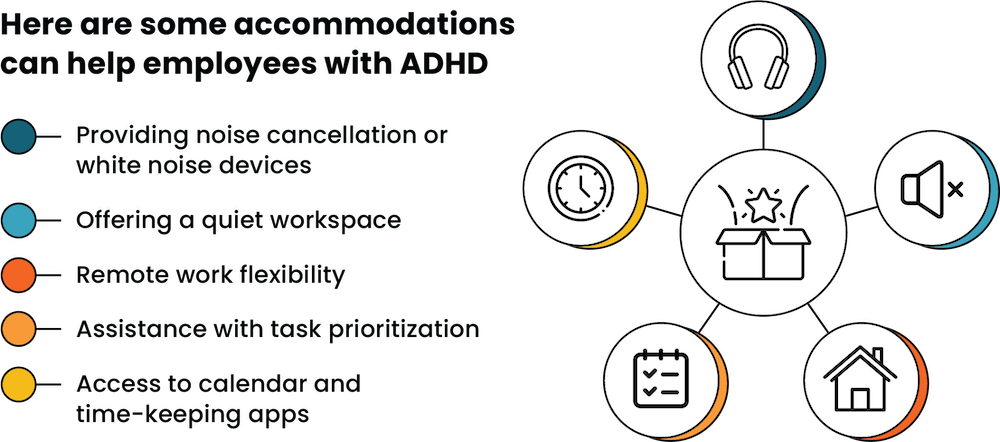When many people think of workplace accommodations, employees with physical disabilities who need equipment-related solutions often come to mind. For example, specialized keyboards for people with mobility issues or specific types of chairs to accommodate back pain.
However, a wide range of disabilities can be “hidden” or “invisible” to fellow co-workers. This category of disability covers a lot of conditions that could impact the way someone works. They can include conditions such as autism, ADHD, arthritis, brain injuries, mental illnesses, diabetes, epilepsy, chronic pain, dyslexia, and more.
Employees with invisible disabilities often feel the need to hide their condition to be seen as “not a problem employee”, or to avoid stigma or stereotypes. However, many of the accommodations for these types of disabilities cost less than $500—or often nothing at all— but can make a huge difference to the employee’s experience and their overall productivity.
In this article, we’ll learn more about one specific invisible disability, attention deficit hyperactivity disorder (ADHD). This disorder affects an estimated 4.4 percent of U.S. adults. That means it’s very likely that there are employees with ADHD in your workplace, especially if you work for a large employer.
What is ADHD and how can it affect employees?
ADHD can have a wide range of symptoms, and some can easily be misunderstood in the workplace. An otherwise talented and skilled employee with ADHD might display some or more of the following:
- Difficulties with attention to detail
- Challenges with starting and completing tasks
- Fidgeting and restlessness
- Having a hard time staying focused and regulating attention
- Struggling with time management and organization
- Talking too much and a tendency to interrupt
- Low frustration tolerance
It’s important to note that most people with ADHD will not struggle with everything listed above. ADHD symptoms can be mild or severe, depending on the individual.
What are the benefits of recruiting and retaining employees with ADHD?
People with ADHD have a lot to offer as employees. In fact, within the ADHD community, they refer to their unique skills as “ADHD superpowers”. Employers who recruit and retain workers with ADHD have the advantage of employing individuals with many of the following traits:
- Creativity and out-of-the-box thinking
Several studies have examined this, and found that people with ADHD consistently score higher on tests related to creative thinking than their non-ADHD peers. - Performing well under stress and in high-intensity situations
Individuals with ADHD do well in roles with a sense of urgency and pressure, such as ER doctors, nurses, firefighters, athletes, and journalists. - Getting things moving and taking risks
While many of us tend to drag our feet and be overly cautious about starting a new task or project, people with ADHD are great at jumping in and getting things going. Even better, once a project starts, some employees with ADHD can tap into their ability to hyperfocus and become incredibly productive. - Noticing things others don’t and seeing things in a different way
Because individuals with ADHD struggle with information and sensory overload, they also have the ability to notice details and patterns others tune out. This also allows them to see multiple sides of a situation or problem far more easily.
This list is by no means exhaustive. The ADHD mind can be a wonderful complement to more neurotypical thinkers on a team. By providing the right workplace accommodations for employees with ADHD, you can not only address the challenges they face, your organization benefits from the advantages they bring.

What type of accommodations can help employees with ADHD?
Many of the accommodations that can help employees with ADHD don’t require spending a lot of money. HR teams can use the interactive process to determine what will help each employee fulfill their job duties well. According to JAN (Job Accommodation Network), the following accommodations are often beneficial for employees with ADHD.
To address challenges with hyperactivity and impulsivity, your workplace could offer:
- Remote work or a private workspace
- Modifications to the way they are supervised
- Assistance from a job coach or through services provided by an EAP (employee assistance program)
- Structured breaks
Accommodations that can help people with ADHD minimize distractions can include:
- Keep interruptions to a minimum
- Allowing the use of noise cancellation headphones or white noise devices
- Providing either a quiet workspace or remote work flexibility
- Focusing an employee’s role on only the most essential tasks
To help employees with ADHD manage time more effectively, you could provide:
- Assistance with task prioritization
- Minimizing marginal functions so employees can stay focused on core duties
- Ensuring expectations are fully communicated
- Partner them with a mentor or a peer to review work and provide feedback
- Technology and software, including apps, calendaring systems, and time keepers
Of course, this is not an exhaustive list. The employees themselves can be a great resource for ideas of potential accommodations. The great news is that the vast majority of these accommodations cost very little, and can easily be modified and customized to each individual.
What are some best practices for managing accommodations for employees with ADHD?
It is important to note that employees who disclose their ADHD diagnosis are protected from discrimination under the Americans with Disabilities Act. Employers are legally required to provide reasonable accommodations to help them perform essential functions of their job. Beyond being compliant with the law, it also benefits your work culture and everyone’s employee experience to follow ADA best practices when accommodating employees with ADHD. Let’s take a look at a few of the most important ones.
- Providing a robust, well-managed interactive process
Because ADHD has a range of symptoms and a wide range of potential accommodations, spending the right amount of time on the ADA interactive process becomes very important. The better the interactive process goes, the more likely you are to provide accommodations that have a long-lasting, positive effect. - Make it easy and stigma-free to request an accommodation
Unfortunately, even if you see an employee struggling, you can’t require them to ask for an accommodation. The best approach is to raise internal awareness around workplace support for mental health, and include clear instructions for how to request an accommodation. Using software like AbsenceSoft that offers a self-service portal can also provide employees an easy way to make and track a request for an accommodation, especially if they are hesitant about calling or emailing someone directly. - Don’t forget to check back in
Once you have implemented an accommodation for someone with ADHD, don’t forget to check back in periodically to see how it is going. If the accommodation isn’t having the desired result, you can restart the interactive process to try something else. With accommodation management software, you can set automated reminders to follow up, and you can record feedback in a single, centralized location. You can also quickly restart the process if needed, or record if an accommodation was successful.
Conclusion
Employees with ADHD add creativity, energy, and insight to any workplace. Even better, making sure they have the right accommodations to perform their best doesn’t have to be difficult or expensive. In fact, by raising awareness of hidden and invisible disabilities like ADHD in the workplace, and making accommodations easy to request, your overall work culture will improve. You will be building an important foundation as an accepting and inclusive work culture, where everyone feels comfortable and can perform their best.
For an indepth look into how to use technology to transform the way you handle workplace accommodation, check out our free guide: “Best Practices for Modern ADA and Accommodation Management.” To see how AbsenceSoft can help you more effectively manage accommodations, schedule a demo today.

